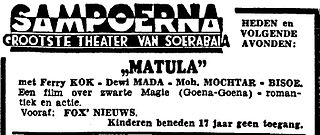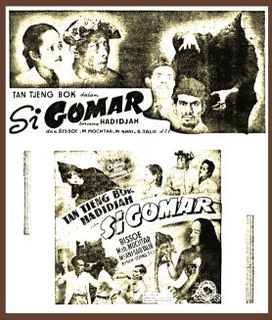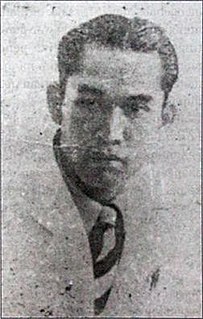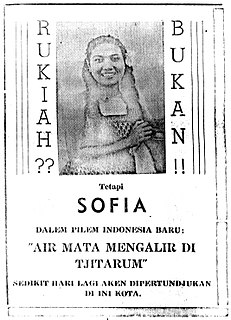
Njai Dasima is a 1929 silent film from the Dutch East Indies. It details the fall of a rich mistress at the hands of a greedy delman driver. The first film released by Tan's Film, the film – adapted from an 1896 novel – was a critical and commercial success. It was released in two parts, followed by a sequel, and remade another two times by 1940.
Nancy Bikin Pembalesan is a 1930 film from the Dutch East Indies. It was released by Tan's Film Company and a sequel to the 1929 two-part film Njai Dasima; it follows Dasima's daughter Nancy on her quest for vengeance. Like its predecessor, it was a commercial and critical success.

Rentjong Atjeh is a 1940 action film from the Dutch East Indies directed by The Teng Chun. Telling of a group who take revenge against pirates in the Strait of Malacca, it starred Ferry Kock, Dewi Mada, Bissoe, Mohammad Mochtar, and Hadidjah. It was filmed near the shore in Batavia and reused footage from The's earlier work Alang-Alang (1939). Rentjong Atjeh, inspired in part by the Tarzan films, was a commercial success, although it may now be lost.
Tan Tjoei Hock was a Chinese-Indonesian journalist and filmmaker. Born in Batavia, he was discovered by The Teng Chun in the late 1930s. Tan became one of the most productive film directors of the Dutch East Indies between 1940 and 1941, directing nine films – primarily action.

Ratna Moetoe Manikam, also known by the title Djoela Djoeli Bintang Tiga, is a film from the Dutch East Indies.
Si Ronda is a 1930 silent film from the Dutch East Indies which was directed by Lie Tek Swie and starred Bachtiar Effendi. Based on contemporary Betawi oral tradition, it follows the exploits of a bandit, skilled in silat, known as Si Ronda. In the lenong stories from which the film was derived, Ronda was often depicted as a Robin Hood type of figure. The production, now thought lost, was one of a series of martial arts films released between 1929 and 1931. Si Ronda received little coverage in the media upon its release. A second adaptation of the tale, Si Ronda Macan Betawi, was made in 1978.

Air Mata Iboe is a 1941 film from the Dutch East Indies directed and written by Njoo Cheong Seng. Starring Fifi Young, Rd Ismail, Ali Sarosa, and Ali Joego, it followed a mother who raises her children lovingly but is ultimately betrayed by her eldest sons when she falls upon hard times. The film, billed as a "musical extravaganza," featured a soundtrack by R. Koesbini, and an eponymous title song written by Njoo.

Panggilan Darah is a 1941 film from the Dutch East Indies written and directed by Sutan Usman Karim and produced by Tjho Seng Han for Oriental Film. The black-and-white film starred Dhalia and Soerip as orphaned sisters trying to make a living in the colonial capital of Batavia before moving to Kudus to work at a clove cigarette factory.

Matjan Berbisik is a 1940 film from the Dutch East Indies which was directed by Tan Tjoei Hock and produced by The Teng Chun. Starring Hadidjah and Mohamad Mochtar, the film follows two men who are raised as brothers and compete for the love of the same woman. A copy of the black-and-white film, which featured keroncong music, is stored at Sinematek Indonesia.

Srigala Item is a 1941 film from the Dutch East Indies that was directed by Tan Tjoei Hock and produced by The Teng Chun for Action Film. Starring Hadidjah, Mohamad Mochtar, and Tan Tjeng Bok, the film's plot – inspired by Zorro – follows a young man who became a masked vigilante to take revenge against his conniving uncle. Srigala Item was a commercial success, which Misbach Yusa Biran credits to the plot's use for escapism. A copy of the black-and-white film, which featured kroncong music, is stored at Sinematek Indonesia.
Sorga Palsoe is a 1941 film from the Dutch East Indies which was directed by Tan Tjoei Hock for Java Industrial Film. The tragedy, starring Lo Tjin Nio, Tong Hui, Lim Poen Tjiaw, and Rohana, was a commercial failure. It is likely lost.

Bengawan Solo is a now-lost 1949 film from what is now Indonesia. Directed by Jo An Djan, it starred Sofia WD, Rd Mochtar, and Mohamad Mochtar.

Matula is a 1941 film from the Dutch East Indies which was directed by Tan Tjoei Hock and produced by The Teng Chun of Java Industrial Film. The black-and-white film, now likely lost, follows a young man who tries to give a woman's soul to a shaman as payment for being made handsome.
Njai Dasima is a 1932 film from the Dutch East Indies which was directed by Bachtiar Effendi for Tan's Film. It was the second film adapted from G. Francis' 1896 novel Tjerita Njai Dasima, following a silent version in 1929. Starring Momo and Oesman, it followed a young Sundanese njai (concubine) who is tricked into marrying a man who does not love her and ultimately killed for her money. The film, the first talkie produced by its company, was also the first directed by a native Indonesian. The now-lost work received mixed critical reception.

Melati van Agam is a 1940 romance film directed by Tan Tjoei Hock and produced by The Teng Chun. Starring S. Soekarti and A.B. Rachman, the film follows young lovers named Norma and Idrus. The film may be lost.

Si Gomar is a 1941 film from the Dutch East Indies which was written and directed by Tan Tjoei Hock and produced by The Teng Chun. Starring Hadidjah, Mohamad Mochtar, and Tan Tjeng Bok, the movie follows a brother and sister who are separated by robbers and almost marry before their cousin recognises them.

Mas Sardi was an Indonesian composer and musician notable for being the country's first professional music supervisor. He and his wife Hadidjah were the parents of Citra Award-winning musician Idris Sardi.

Air Mata Mengalir di Tjitarum is a 1948 film from what is now Indonesia, written and directed by Roestam Sutan Palindih for the Tan & Wong Bros Film Company.
Singa Laoet is a 1941 film from the Dutch East Indies. Directed by Tan Tjoei Hock and produced by The Teng Chun, it starred Tan Tjen Bok, Mohamad Mochtar, and Hadidjah.














